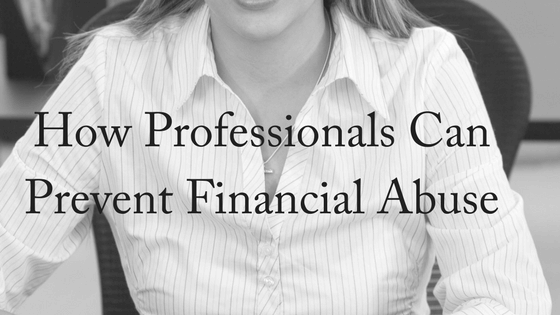Elder financial abuse is a growing problem, usually carried out by family members. However, there are cases where professionals have also been charged with stealing from or exploiting older people. The biggest risk factor for older people is cognitive decline: that is, dementia or other illness that reduces their mental capacity. In Florida, an arbitration panel awarded more than $34 million to the estate of Roy M. Speer, the co-founder of the Home Shopping Network, in its claim against Morgan Stanley for churning Mr. Speer’s account.
The arbitrators found that Morgan Stanley violated a Florida law against exploitation of vulnerable adults. It awarded $32.8 million in compensatory damages to Lynnda Speer, Mr. Speer’s widow and representative of the estate, as well as $1.5 million to reimburse costs incurred during the arbitration process, which spanned 13 months and involved 142 hearing sessions.
 The award covered a period from January 2009 to June 2012 and involved investments in the banking and financial services sectors. “The unauthorised trading was rampant,” the widow’s lawyer, Mr. Ilgenfritz, said in an interview. “They were trading individual bonds like pork bellies.”
The award covered a period from January 2009 to June 2012 and involved investments in the banking and financial services sectors. “The unauthorised trading was rampant,” the widow’s lawyer, Mr. Ilgenfritz, said in an interview. “They were trading individual bonds like pork bellies.”
Mr. Speer, who died in August 2012, suffered from dementia, according to Mr. Ilgenfritz. He asserts that Mr. Speer was exploited by Ms. Forte, who was alleged to be in a relationship with Mr. Speer in addition to serving as his broker. Mr. Speer’s widow hopes the case will lead to greater protections for elderly investors.
“One of her goals in this whole process was to bring to light the financial abuse and elder abuse of her late husband and to prevent other brokers and investment advisers from taking advantage of their elderly clients,” Mr. Ilgenfritz said. Unfortunately, this type of exploitation occurs in Australia too.
In February this year, a Hobart financial planner admitted stealing $925,000 from a 94-year-old woman. The 60-year-old admitted stealing the money from his elderly client over six years. He was charged after a lengthy investigation by police from Fraud and e-Crime Investigation Services. Ageing Tasmania’s chief executive Sue Leitch said financial elder abuse happened all too often.
“I’m not saying it’s rampant out there but we do know that there are people who are vulnerable and where older people in the community tend to be isolated they are more at risk,” she said.
“So one of the really simple things that older people can do to help protect themselves is to make sure that they are socially connected. We need to try and up-skill people on knowing what their financial status is. With the move to a lot of banking systems being online these days this can be an issue for older people if they’re not aware of how to determine they’re financial position easily.”
Ms Leitch said the impact on elderly people who are exploited financially is considerable. “It can be completely devastating for them severely, affect their mental health and their physical health, and this has been shown in previous cases,” she said.
It still remains true that the majority of perpetrators of elder financial abuse are the adult children of the older person. Perth financial planner Nick Bruining, who specialises in retirement incomes, said he regularly saw client transactions that raised alarm bells.
“I would say that anywhere from one-quarter to one-third of all abnormal transactions are people accessing money for family members,” Mr Bruining said. “You get a sense that with some of those transactions there is a bit of elder abuse going on. These days we get a lot of adult kids that rely on their parents financially. I am aware of many cases where you see a parent needing $5,000 to clear a child’s credit card bill.”

Mr Bruining said he had been used as gatekeeper by clients wishing to refuse family requests for money.
“Let’s not underestimate the love that parents have for their kids — they want to help them out — and unfortunately that’s what some kids tap into and abuse,” he said. “Often people use us and say they have spoken to their financial advisers and they can’t get the $5,000.”
Mr Bruining said people in his industry would benefit from learning about the early signs of elder abuse and knowing when and how to raise the alarm.
How to protect the elderly from financial abuse:
- Maintain open communication with the older person
- Take any concerns seriously
- Watch for changes in older person’s appearance or mood
- Recognise signs of financial abuse, such as unpaid bills or missing money
- The biggest risk factor for financial abuse is cognitive impairment in the older person. Ensure that the correct legal protections are in place
- Talk to many professionals.
If you suspect elder financial abuse is happening, seek legal advice immediately. The sooner you seek advice the easier it is to remedy, and the financial losses can potentially be minimised. We offer a free, 10-minute phone consultation. Contact us today!

